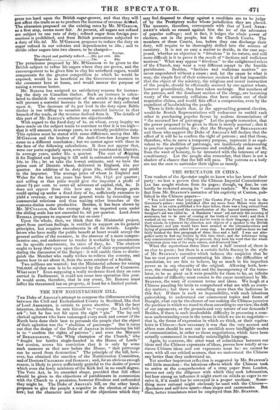THE SPECTATOR IN CHINA.
THE readers of the Spectator ought to know who has been of their party : no less a person than the Chinese Imperial Commissioner LIN has sought wisdom from its pages ; though, we fear, he can hardly be reckoned among its " constant readers." We learn the fact from Mr. STANTON'S narrative of his captivity at Canton, pub- lished in the Chinese papers- " Yon well know that your paper [the Canton Free Press] is read in the Governor's palace : none published after my move from Macao were shown me, but in an extra published a few days before, there was a long extract from the Spectator, far beyond the comprehension of the learned interpreter. The foreigner's aid was called in. A Mandarin must ' ask not only the meaning of sentences, but to be sure of coming at the truth of every word; and thus I worked on my way. The Chinese hav'nt words in their language, or ideas in their minds, to represent tLe situation and objects of a speaker in the British Parliament; and you would have been amused at the circumlocutions and laying of groundwork called for at every step. In about half-an-hour we had fairly finished the first paragraph of three lines and a half. I was not alto- gether sorry to find my friends by this time tired; and the informant being very communicative and willing to proceed, they took his word that the whole mysterious piece was of the same nature, and dismissed him." What the mysterious three lines and a half treated of, there is no clue to guess ; but there is a certain feeble fluency in the style of Mr. STANTON'S narrative which induces the suspicion that he has no vast powers of concentrating his ideas : the difficulties of translation, we are fain to believe, lay as much in his imperfect power as in any obscurity of the original. Allowing both, how- ever, the obscurity of the text and the incompetency of the trans- lator, to be as great as it were possible for them to be, an infinite remainder of difficulty must consist in the cause mentioned by Mr. STANTON, the want of common terms and ideas. We laugh at a Chinese puzzling his brain to comprehend what are with us every- day matters • but there is something more than the ludicrous in this fact. If there is such an impossibility, with such laborious painstaking, to understand our commonest topics and forms of thought, what can be the chance of our making the Chinese perceive the position in which we stand to them according to our view, the drift of our arguments, or the grounds and very nature of our demands ? Besides, if there is such incalculable difficulty in procuring a com- mon understanding even in the terms in which we are to negotiate— that is, the forms of expression in which we think, or their equiva- lents in Chinese—how necessary it was that the very acutest and ablest man should be sent out to establish more intelligible modes of communication, in order to those negotiations, which have been actually commenced in mutually unintelligible language.
Again, by converse, the utter want of coincidence between our ideas and the Chinese exponents of ideas, proves how totally at va- riance Chinese ideas and our exponents must be : we cannot be sure, with all our critical acumen, that we understand the Chinese any better than they understand us.
Yet another important reflection is suggested by Mr. STANTON'S odd little anecdote : the laborious efforts which the Chinese took to arrive at the comprehension of a stray paper from London, proves not only the diligence with which they seek information, but how strong an influence it might exert on minds so eager to re- ceive it, if it could but be conveyed in a proper medium. Some- thing more rational might obviously be used with the Chinese— Spectators and self-love apart—than sieges and cannonades. But then, better translators must be employed than Mr. STANTON.


























 Previous page
Previous page